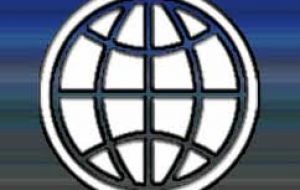MercoPress. South Atlantic News Agency
Uruguay poised to grow 4% this year; Argentina and Brazil, 3.4%, says World Bank
 Latin America remains vulnerable because of its dependence on commodities exports, particularly to China
Latin America remains vulnerable because of its dependence on commodities exports, particularly to China  Latin America remains vulnerable because of its dependence on commodities exports, particularly to China
Latin America remains vulnerable because of its dependence on commodities exports, particularly to China Uruguay’s economy is poised to grow 4% this year and in 2014, which is above the region’s average, according to the World Bank’s latest Global Economic Prospects issued this week. However Uruguay will be ranked twelfth in the growth ranking of Latinamerica this year but ahead of Brazil and Argentina with 3.4%.
The WB report anticipates Latinamerica and the Caribbean will expand 3.5% this year which is higher than the 3% of 2012, but the overall performance of the region is not homogeneous. The ranking is as follows: Paraguay, 8.5%; Panama, 7.5%; Haiti, 6%; Peru, 5.8%; Chile, 5.1%; Guyana, 4.8%; Suriname, 4.5%; Bolivia, 4.4%; Dominican Republic, 4.3%; Nicaragua, 4.2% and Costa Rica and Uruguay, 4%.
Regarding the leading economies of the region, the World Bank estimates that Brazil will expand 3.4% (after a dismal 0.9% in 2012); Mexico, 3.3% (4%); Colombia, 3.8% (3.5%) and Argentina, 3.4% (2%).
Last October the WB had estimated that Latam and the Caribbean would grow an average 3.8%, but uncertainties in the European Union, China and the US forced to lower the forecast.
Uruguay’s 4% expansion is based on a climate of “more complacent” economic policies mainly Brazil but also ‘strong foreign and domestic demand’.
However the World Bank also points out that the strongest deceleration among developing countries last year took place in Latam and it is still threatened by tensions from speculative capital inflow, the slowdown in the EU and US and its own policy mistakes, basically the consequences of not applying the anti-cyclical rule.
Of the 412 billion foreign capital influx (both private and public) which found its way to the developing countries from January to October 2012, Latam and the Caribbean received a third. Likewise in the third quarter of last year industrial production started to recover from several irregular performing previous quarters, and again seemed to succumb in the last quarter.
As the region and particularly South America are growingly dependent from exports to Southeast Asia, mainly China, the risk of deceleration is even greater than expected, and this applies to those countries exporters of commodities.
Brazil’s performance could experiment the impact of the lower interest rates policy while Mexico will be subject to the ups and downs of the US economy and Argentina will be influenced by the effects of advancing “interventionist policies” in the economy.
Paraguay will recover from recession caused by the major drought of 2012 while Bolivia, Ecuador and Venezuela, energy exporters, face lower growth expectations, says the bank’s global economic prospects.




Top Comments
Disclaimer & comment rules-

-

-

Read all commentsI wouldnt bet on this. Uruguay seriously overspent on thier budget last year. Instead of fixing the problem of overspending the govt proposes to raise more taxes through IRAE to cover the hole
Jan 17th, 2013 - 08:08 pm 0”Argentina, 3.4% (2%).”
Jan 17th, 2013 - 08:13 pm 0Really? And how is that going to happen when the economy is in free fall and the farmers are under continuing pressure from TMBOA?
It is because of AG that Uruguay has slid down the ranking. All we need is someone, anyone, with the backbone to tell TMBOA to go fuck herself (I cannot imagine anyone else doing it).
is this including inflation figures?
Jan 17th, 2013 - 09:21 pm 0Commenting for this story is now closed.
If you have a Facebook account, become a fan and comment on our Facebook Page!